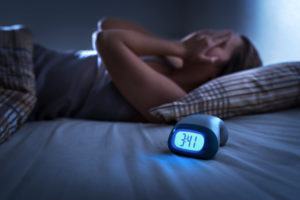
Do you wake up frequently at night? Are you always exhausted at work because you can’t get a good night’s rest? If you are feeling desperate for some quality sleep, you may be tempted to take sleeping pills. However, if your trouble sleeping is linked to sleep apnea, medication can actually make your condition worse. Keep reading to discover how sleeping pills affect sleep apnea symptoms and how your dentist can help.
What Is Sleep Apnea?
Sleep apnea is a common sleep disorder that affects an estimated 20 million Americans each year. People with sleep apnea experience repeated interruptions of breathing while they sleep. These interruptions, which last for 10 seconds or longer, can occur dozens or even hundreds of times each night.
The most common form of sleep apnea, known as obstructive sleep apnea, occurs when a person’s neck and throat tissue relaxes and blocks airflow. If left untreated, sleep apnea can lead to serious health problems, such as high blood pressure, heart attacks, strokes, and more.
Common symptoms of sleep apnea include:
- Snoring
- Waking up with a dry mouth
- Waking up with a sensation of choking
- Daytime sleepiness
- Trouble concentrating at work
- Insomnia
- Weight gain
- Depression or anxiety
- Headaches
- Irritability
How Sleep Pills Affect People with Sleep Apnea
Many people who have consistent trouble getting a good night’s rest turn to sleeping pills. These medications can help individuals with insomnia fall and stay asleep.
However, insomnia and sleep apnea are two different sleep disorders (although they can exist together). If you take sleeping pills for insomnia but don’t realize you are also affected by sleep apnea, you could actually negatively impact your sleep condition.
Sleeping pills relax both the mind and body, including the tissues in the back of the throat. When your throat muscles relax, they can fall backward and obstruct the airway. In this way, sleeping pills can make snoring and sleep apnea worse.
How to Effectively Treat Sleep Apnea
If you are affected by sleep apnea, there are some behavioral changes you can make that may reduce your symptoms, such as:
- Limiting caffeine consumption
- Quitting smoking
- Eat a balanced diet
- Exercise consistently
- Avoiding alcohol
- Avoiding sleeping pills
If these steps alone do not eliminate your sleep apnea, don’t wait to contact your dentist about sleep apnea treatment in Columbus. In the past, treating sleep apnea usually involved a Continuous Positive Airway Pressure (CPAP) machine. CPAP machines work by pumping oxygenated air through a tube and mask worn at night. While effective, many patients find CPAP machines to be noisy and uncomfortable.
Fortunately, there are other ways to treat sleep apnea, such as oral appliance therapy. An oral appliance is a small mouthpiece worn at night that repositions the jaw to prevent airflow from becoming blocked.
If you are having trouble sleeping, don’t automatically reach for sleeping pills. Reach for the phone instead and call your dentist to ask about oral appliance therapy!
About the Author
Dr. Eric Buck is passionate about helping his patients in central Ohio get a good night’s sleep. An active member of the American Academy of Dental Sleep Medicine, he regularly treats sleep apnea with custom oral appliance therapy. To learn more about sleep apnea treatment in Columbus, visit the Columbus Sleep Center website or call 614-956-9305.
